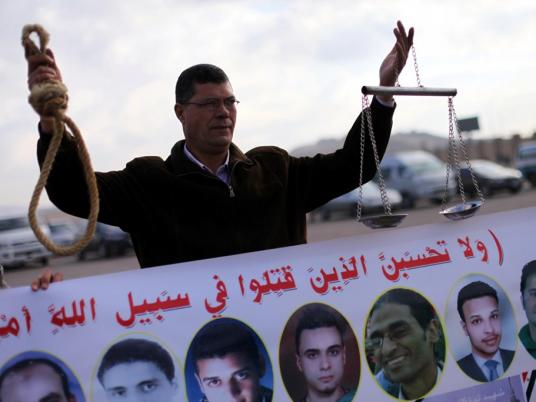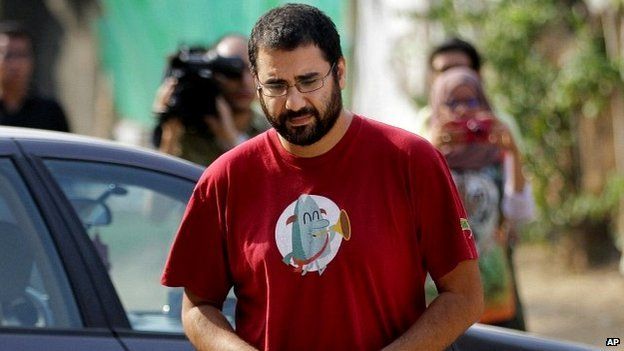
Egypt Independent spoke to ten lawyers to get their sense on the ousted President Hosni Mubarak verdict which is supposed to be pronounced tomorrow by Judge Ahmad Refaat. While most of them agreed that they don't expect an adjournment of the verdict, they differed on what to expect. While many thought the verdict against Mubarak will be in the form of a light sentence, others insisted the case's outcome is unpredictable due to the intricate relation between the legal system and the political conditions of the historic case.
Montasser al-Zayat, a lawyer representing Islamists jailed under the Mubarak regime:
Heavier sentences against Mubarak’s aides
I expect announcement of the verdict to be postponed because it would be the final straw given current events in the country. Given the election, an innocent verdict would be a problem because it will lead to protests and might work in presidential candidate and former regime figure Ahmad Shafiq’s interests. A guilty verdict would be in Mohamed Morsy’s favor.
The heaviest sentences will be handed down to [former Interior Minister] Habib al-Adly and [former assistant Interior Minister] Ismail al-Shaer and [former State Security Investigations officer] Hassan Abdel Rahman. I believe Adly will receive the death sentence while Shaer and Abdel Rahman will receive life sentences.
Mubarak may be cleared or receive a five year sentence at the most. Gamal and Alaa Mubarak meanwhile will likely receive sentences of between 10 and 15 years.
Ahmed Mekky, former judge
Mubarak charged, Adly acquitted
I believe that custodial sentences will be handed down for the killing of protesters charges but that Adly will be found innocent because he submitted documents proving that he advised against opening fire on protesters.
I don’t expect the case to be adjourned.
Negad al-Borai, lawyer and head of the United Group of Attorneys
5-7 year sentence for Mubarak
I believe that not guilty verdicts will be handed down in all the cases against police officials accused of killing protesters and that guilty verdicts will only be given for the profiteering and bribery charges.
Mubarak might receive a prison sentence of between five and seven years imprisonment while Gamal and Alaa might be sentenced to between 10 and 15 years in prison. These are all just guesses. Judges of course have the right to postpone announcement of sentences one or two times, and this may happen on Saturday.
Nasser Amin, lawyer and head of the Center for the Independence for the Judiciary
Light sentences for charges of protesters’ killing
I believe light sentences will be handed down for the killing of protesters charges — five years at most — or that they will be found innocent. As for the financial crimes charges against Hussein Salem [a businessman accused of crimes relating to Egypt’s gas sale to Israel] and Gamal and Alaa, the sentence will be between five and 10 years imprisonment.
It’s unlikely that the case will be adjourned because that means adjourning it for a whole year; the presiding judge is about to retire and when a judge is changed the case has to be reheard from the beginning.
The whole case was badly put together and disorganized and was marred by irregularities. It faced judicial independence issues and the public prosecution did not have the experience needed to deal with these types of crimes.
Hoda Nasrallah, lawyer with the Egyptian Initiative for Personal Rights
Financial case more concrete
In the case of the killing of protesters, it's possible for the defendants to be acquitted, for Mubarak to be acquitted while some of his senior officials take the fall for him, or for all of them to be convicted of murder.
Mubarak is more likely to be convicted in the gas exporting case in which there is more concrete evidence against him.
Mohsen al-Bahnassi, human rights lawyer
Sentence will not be light
While the case presented to the court was not strong enough for a guilty verdict, the court’s investigations and some of the witness testimonies might be enough to find the defendants accused of incitement to kill guilty.
If this happens, a light sentence will not, as many people think, be handed down because Mubarak was head of state and according to the Constitution, protecting citizens’ interests and well being is one of his duties. Accordingly, the court does not have the right to lighten the sentence.
Regardless of the fact that the public prosecution office presented a weak case in a careless way, and despite the fact that the witnesses stood with Mubarak, and despite the fact that the evidence isn’t damning of Mubarak, the court looked into the case thoroughly. The court was struck by some of the witness evidence confirming that Mubarak knew that protests were taking place and that communications were cut to counter them and that people were being killed. The interior minister gave him full reports from the streets and Mubarak could have issued an order to stop the violence but didn’t.
Abdel Moneim Abdel Maqsoud, lawyer for the Muslim Brotherhood
Death penalty!
While it’s difficult to make any predictions, I hope that the death penalty is handed down. It’s quite possible that it may be, because the registration and description in the deposition and the charges referred by the prosecutor to the courts allow for a judgment that could extend to capital punishment. If the case is made for the court that these charges were committed, under that set of circumstances, they would all be executed.
I believe however that the last two defendants in the case [Interior Minister officers] Osama al-Maraasi and Omar al-Farmawy may be found innocent.
Prison sentences will be handed down for the other charges.
Sayed Fathy, human rights lawyer
Unpredictable
Nobody can predict what will happen because it is a unique and unprecedented case.
Ahmed Ezzat, lawyer with the Association for the Freedom of Thought and Expression
It’s more political than legal
Nobody can predict what the verdict will be because it’s a unique case. It is also political more than it is legal; the case presented to the court was deliberately weak and the verdict handed down will not be fair — this is clear from the court’s performance.
There are two main factors influencing the judge: independence and his conviction that the defendants are guilty, and we all know of course that the Egyptian judiciary is not independent.
Mohamed Abdel Aziz, laywer with Al-Nadeem Center for the Rehabilitation of the Victims of Torture
Impossible to predict a ruling
We expect them to be acquitted and we expect them to be convicted. In criminal cases it's impossible to foresee the judgment because it's all left to the judge's determination. It's unlikely that the judgment will be postponed because the judge has had over two months to review the case. The postponement could cause public unrest because it will be seen as an acquittal in the process.
Taher Abol Nasr, human rights lawyer
Emotions driving expectations
I have a feeling as a lawyer in the case that a damning guilty verdict will be handed down but I’m unable to say whether this is a logical prediction or whether I’m influenced by my emotions and my desire that a heavy sentence be issued against the defendants.
My emotions as a lawyer working on this case have gotten the better of me — especially since I lived this case page by page and saw protesters’ blood with my own eyes, transported the injured in my car and lived with the relatives of the martyred and wounded. I can’t be neutral.
The only thing I can be sure of is that the verdict will be issued on Saturday and there will be no adjournment.




